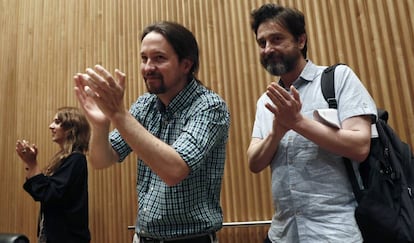Acting Spanish PM may head to investiture vote without support of Unidas Podemos
The leader of the anti-austerity party, Pablo Iglesias, warned that Pedro Sánchez will not have enough votes to be sworn in on the first round of voting, which is likely to take place on July 16

The political situation in Spain remains deadlocked with the Socialist Party (PSOE) and left-wing Unidas Podemos group still unable to reach an agreement that would allow Pedro Sánchez to be reelected as prime minister.
Sánchez earned the most seats at the April 26 general election, but still needs support to reach an overall majority and get back into office at a parliamentary vote.
An agreement is closer than it seems, although we will have to wait two-and-a-half months
Unidas Podemos leader Pablo Iglesias
Sánchez and Unidas Podemos leader Pablo Iglesias had agreed to negotiate a “government of cooperation” but are refusing to budge from their respective positions over what this means. The PSOE leader is willing to offer Iglesias mid-level government positions but the anti-austerity chief wants Cabinet positions that will reflect his party’s weight relative to the PSOE in parliament (42 seats versus 123) – an idea Sánchez has rejected.
In an effort to break the deadlock, the acting prime minister announced that he will set a date for the investiture vote with the speaker of Congress, Meritxell Batet, on Tuesday. While the government says no decision has yet been made, the vote is likely to happen on July 16.
But the move has not had the desired effect. On Wednesday, Iglesias warned that the first investiture vote, where an absolute majority of 176 votes is needed, will fail. “An agreement is closer than it seems, although we will have to wait two-and-a-half months,” he said.
We would like Podemos to clarify if it is going to vote against the investiture of a leftist prime minister
PSOE deputy secretary general Adriana Lastra
If Sánchez does not secure enough votes at the first investiture vote, negotiations will resume after summer and a second vote, where only a simple majority is needed, will take place in September.
Unidas Podemos has accused the PSOE of looking for support from the right-wing Popular Party (PP) or center-right Ciudadanos (Citizens), which won the second- and third-highest number of seats, respectively, at the April polls. An abstention from either party would help Sánchez get reelected as prime minister.
According to the parliamentary spokesperson for Unidas Podemos, Irene Montero, setting a date for the investiture vote was a “pressure mechanism” from the PSOE. She added: “It saddens us to see how [the Socialist Party] is looking for support from the right, is threatening repeat elections and wants to go to a failed investiture ceremony.”
On Wednesday, Adriana Lastra, PSOE deputy secretary general, denied that Sánchez was looking for support from the right-wing Popular Party (PP) or center-right Ciudadanos (Citizens), which won the second- and third-highest number of seats, respectively, at the April 28 general election.
“The left knows how to understand each other. We would like Podemos to clarify if it is going to vote against the investiture of a leftist prime minister, or shake hands with the PP, Ciudadanos and Vox,” said Lastra.
The PSOE remains hopeful that Podemos or Ciudadanos, which is facing increasing internal criticism over its leader Albert Rivera’s point-black refusal to support Sánchez’s investiture, will bow to the pressure. The Socialists have not even ruled out an unlikely abstention from the PP.
But Podemos is equally optimistic that the PSOE’s “Plan A” – that Ciudadanos will abstain – will fail, meaning the party’s 42 votes will be crucial if Sánchez is to reach a majority.
The political deadlock does not just affect the investiture vote, but also how the Socialists will be able to govern and pass budgets once in power.
Repeat elections?
While some within the PSOE recognize there are advantages of repeat elections – polls show the party would improve its results while Unidas Podemos would lose more seats – they admit that it is a risky option, given the political fatigue it would cause.
“Why would someone who has won the elections and doubled the seats of the second-placed party want to repeat elections?” asked sources within the government.
According to the Spanish Constitution, if the prime minister is not sworn in within two months of the first investiture vote, new elections must be called 54 days later.
English version by Melissa Kitson.
Tu suscripción se está usando en otro dispositivo
¿Quieres añadir otro usuario a tu suscripción?
Si continúas leyendo en este dispositivo, no se podrá leer en el otro.
FlechaTu suscripción se está usando en otro dispositivo y solo puedes acceder a EL PAÍS desde un dispositivo a la vez.
Si quieres compartir tu cuenta, cambia tu suscripción a la modalidad Premium, así podrás añadir otro usuario. Cada uno accederá con su propia cuenta de email, lo que os permitirá personalizar vuestra experiencia en EL PAÍS.
¿Tienes una suscripción de empresa? Accede aquí para contratar más cuentas.
En el caso de no saber quién está usando tu cuenta, te recomendamos cambiar tu contraseña aquí.
Si decides continuar compartiendo tu cuenta, este mensaje se mostrará en tu dispositivo y en el de la otra persona que está usando tu cuenta de forma indefinida, afectando a tu experiencia de lectura. Puedes consultar aquí los términos y condiciones de la suscripción digital.








































